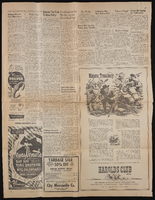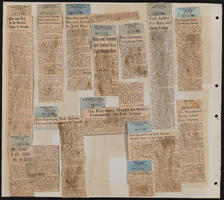Search the Special Collections and Archives Portal
Search Results
James Cashman Sr. Photograph Collection
Identifier
Abstract
The James Cashman Sr. Photograph Collection (approximately 1905 to 1975) consists of black-and-white photographic prints, negatives, slides, and albums as well as a glass plate negative. The photographs depict four major subjects: Cashman's family, friends, and associates; Cashman's businesses; the Hoover Dam and Colorado River; and various locations across Nevada.
Archival Collection
Ham Family Photograph Collection
Identifier
Abstract
The Ham Family Photograph Collection contains five photographic albums primarily featuring images of the Ham family's travels throughout the western United States and Artemus W. Ham Jr. and Betty Ham Dokter during their childhood between approximately 1900-1949. Also included is one photograph used as a Christmas greeting for the Ham family from 1981. The photographs feature locations including Cedar Breaks National Monument, Utah; Grand Canyon, Arizona; and Yosemite National Park, California. The collection also contains photographs of the Ham family at Mormon sites throughout Utah. Lastly, there are postcards and photographs of locations throughout the United States, Germany, and Japan.
Archival Collection

Robert Kim oral history interview: transcript
Date
Archival Collection
Description
Oral history interview with Robert Kim conducted by Kristel Peralta, Cecilia Winchell, Ayrton Yamaguchi, and Vanessa Concepcion on March 05, 2021 for the Reflections: The Las Vegas Asian American and Pacific Islander Oral History Project. In this interview, Kim describes his career in law. He talks about his Korean roots, the model minority myth, and experiencing racial discrimination. Lastly, Kim discusses the Las Vegas Asian American and Pacific Islander (AAPI) community, his involvement with the Asian Bar Association of Las Vegas, and the importance of electing Asian Americans into political positions.
Text

Marvelys Lopez Omaña oral history interview: transcript
Date
Archival Collection
Description
Oral history interview with Marvelys Lopez Omaña conducted by Monserrath Hernandez and Barbara Tabach on February 21, 2020 for the Latinx Voices of Southern Nevada Oral History Project. In this interview, Marvelys Lopez discusses her childhood and growing up in Caracas, Venezuela, where her father owned a toy store. She attended an all-girls Catholic School and from a young age knew that she wanted to be a doctor. In 1993, at the age of seventeen, she was able to study abroad in the United States for one year and moved to Las Vegas, Nevada. She returned to Venezuela to attend medical school and while attending medical school she met her husband, who was studying to be a registered nurse at the time. Lopez Omaña recalls volunteering as a firefighter in Venezuela, and discusses the political change that happened in Venezuela during her last years in medical school. She moved to back Las Vegas with her husband in 2003 and began working as a caregiver. She recounts Her first son's birth story, and describes how she became a Certified Professional Midwife.
Text
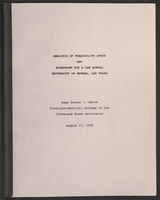
University of Nevada, Las Vegas law school feasibility studies
Date
Archival Collection
Description
Folder contains a study titled "Analysis of Feasibility Study and Blueprint for a Law School, University of Nevada, Las Vegas" by Steven R. Smith, Cleveland-Marshall College of Law, Cleveland State University, August 17,1990 and a second study titled "A Feasibility Study for a Law School at the University of Nevada, Las Vegas" prepared by R. Keith Schwer, PhD, Director, The Center for Business and Economic Research, University of Nevada, Las Vegas, May 29, 1996. From the University of Nevada, Las Vegas William S. Boyd School of Law Records (UA-00048).
Text
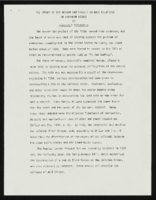
"The Impact of the Hoover Dam Project on Race Relations in Southern Nevada": manuscript draft by Roosevelt Fitzgerald
Date
Archival Collection
Description
From the Roosevelt Fitzgerald Professional Papers (MS-01082) -- Unpublished manuscripts file.
Text
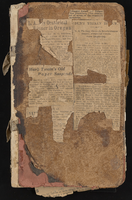

June Monroe and Kazuko Atomura oral history interview: transcripts
Date
Archival Collection
Description
Oral history interviews with June Monroe and Kazuko Atomura conducted by Cecilia Winchell and Stefani Evans on July 14 and July 19, 2022 for Reflections: the Las Vegas Asian American and Pacific Islander Oral History Project. In the first interview, Kazuko Atomura describes her childhood in Taiwan and Tokyo, Japan, and shares both happy and difficult mememories of that time. Atomura eventually moved to Los Angeles, California, where she reconnected with a man she previously met in Japan. She married him and together had their daughter, June Monroe, and another son while living in Corpus Christi, Texas. After difficult medical procedures involving Atomura's husband and Monroe's younger brother, Brian, the family relocated to Las Vegas, Nevada. Monroe recalls attending Las Vegas High School and Bonanza High School, and the struggle of making new friends as a young person. In the second interview, the mother and daughter discuss racism, discrimination, and identity. Kazuko Atomura recalls her many experiences with discrimination as a result of both her appearance and language barriers. June Monroe discusses how she came to be proud of her Japanese heritage, while Atomura discusses some of the community activities she has been involved in since living in Las Vegas including the Japanese Culture Club and odori dancing. Then, both Atomura and Monroe discuss Monroe's brother, Brian, who received two kidney transplants; one from Monroe's father and one from Monroe herself. Atomura talks about the shrines she has built for Brian, the experience of him being on dialysis, care taking, and his final days. Monroe shares about her activism with organ donation, being regularly involved with the Nevada Donor Network and helping to pass significant pieces of legislation within the area of organ donation.
Text

